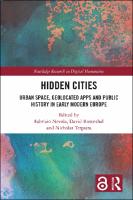Hidden Cities
Proposal review
Urban Space, Geolocated Apps and Public History in Early Modern Europe
Contributor(s)
Nevola, Fabrizio (editor)
Rosenthal, David (editor)
Terpstra, Nicholas (editor)
Language
EnglishAbstract
This groundbreaking collection explores the convergence of the spatial and digital turns through a suite of smartphone apps (Hidden Cities) that present research-led itineraries in early modern cities as public history. The Hidden Cities apps have expanded from an initial case example of Renaissance Florence to a further five historic European cities. This collection considers how the medium structures new methodologies for site-based historical research, while also providing a platform for public history experiences that go beyond typical heritage priorities. It also presents guidelines for user experience design that reconciles the interests of researchers and end users. A central section of the volume presents the underpinning original scholarship that shapes the locative app trails, illustrating how historical research can be translated into public-facing work. The final section examines how history, delivered in the format of geolocated apps, offers new opportunities for collaboration and innovation: from the creation of museums without walls, connecting objects in collections to their original settings, to informing decision-making in city tourism management. Hidden Cities is a valuable resource for upper-level undergraduates, postgraduates, and scholars across a variety of disciplines including urban history, public history, museum studies, art and architecture, and digital humanities.
Keywords
digital humanities; Florence; museum studies; public history; Renaissance Florence; urban historyDOI
10.4324/9781003172000ISBN
9781000554892, 9780367775919, 9781003172000, 9780367775933, 9781000554892Publisher
Taylor & FrancisPublisher website
https://taylorandfrancis.com/Publication date and place
2022Imprint
RoutledgeClassification
European history
General and world history


 Download
Download